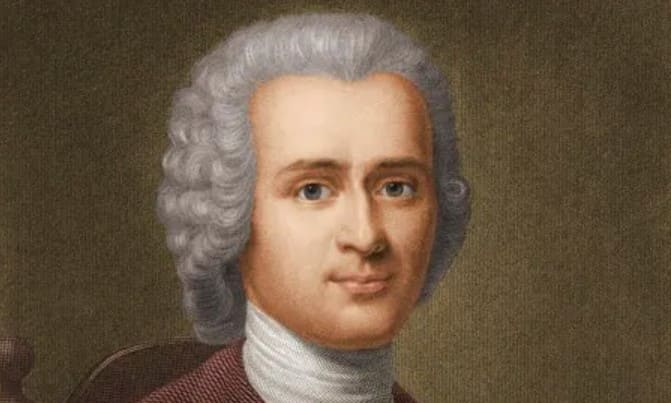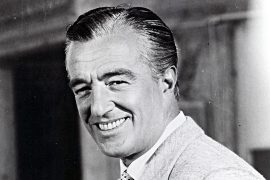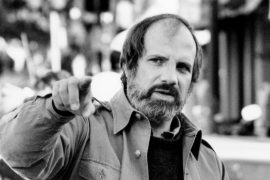The French philosopher, writer and musician is considered one of the most important representatives of the Enlightenment, who advocated individual freedom and opposed the absolutism of church and state. Jean-Jacques Rousseau thus had a great influence on pedagogy and political theories. His understanding of individual rights arose in the transition between the 18th century Enlightenment and the early 19th century Romanticism. His novels, such as “The New Heloise” and “Confessions”, had a decisive impact on French Romantic literature and influenced the following generations of philosophers, thinkers and educators…
Jean-Jacques Rousseau was born on June 28, 1712 in Geneva.
Rousseau came from a Huguenot family who had lived in exile in Switzerland for several generations. His mother died shortly after giving birth. Rousseau was raised as an orphan until his father placed him in the care of his uncle at the age of ten. After a short time he handed over the upbringing of the child to a pastor. Here Rousseau spent a difficult and unhappy childhood. After school he became the secretary and companion of Madame Louise de Warens, a wealthy Calvinist who had converted to Catholicism. As a maternal friend and lover, she had a major impact on Rousseau’s life and prompted him to convert to the Catholic faith as well. After unsuccessful attempts to be accepted into a seminary, he wandered through Switzerland and France from 1730 until he finally settled in Paris in 1742.
It was during these years that he decided to become a writer and musician. In Paris he earned his living as a tutor and as a copyist of scores. Among other things, Rousseau was also active as embassy secretary in Venice. In 1750 he was awarded the prize of the Dijon Academy for his writings “Discours sur les sciences et les arts”. In the French capital he also made the acquaintance of the philosopher Denis Diderot. He commissioned Rousseau to write music-theoretical contributions for the French “Encyclopédie”. In his private life he was in a relationship with the French woman Thérèse Levasseur, whom he married in 1768. Together they became parents of five children, all of whom grew up in the orphanage. In 1755 his writings “Discours sur l’origine et les fondements de l’inégalité parmi les hommes” followed. In it he described the origin and basis of inequality among people. He portrayed people in modern specialized society and described human nature as “good by nature”.
It was only through civilization that man developed into his true being. Original values such as human freedom and innocence are reminiscent, but the step “back to nature” should by no means be demanded. One of Rousseau’s most important legacies is the political treatise “Du contrat social ou principes du droit politique” from 1762. In it he described the basic social rules of constitutional law and took the view that the state as a political organ is in turn built on the social contract, the entered into voluntarily by its residents. Rousseau’s advocacy of the general will over the absolutist state provided the spiritual foundation on which the French Revolution was built. In 1756 Jean-Jacques Rousseau left Paris. He settled in Montmorency, where he wrote his romantic short story Julie ou la nouvelle Héloise (Julie, or the New Heloise) in 1761. Rousseau’s highly acclaimed educational novel entitled “Émile ou de l’éducation” (Emil, or About Education) from 1762 got him into a dispute with the French and Swiss authorities.
As a result, he had to flee to Prussia in 1762. He later traveled to England at the invitation of David Hume. In England, Rousseau began preparing a manuscript on botany entitled “La Botanique”. In 1768 he was able to return to France under the alias “Renou”. In 1770 he published here his autobiographical work entitled “Confessions” (Confessions), on which he had been working since 1761. His musical drama “Le Devin du village” (“The Village Fortune Teller”) was first performed in 1752. His development of tolerant and psychological educational theory led to new methods of raising children and influenced educators such as Johann Heinrich Pestalozzi. Rousseau’s subjective approach influenced the thinking of writers like J.G. von Herder, Johann Wolfgang von Goethe and Friedrich von Schiller. His political reflections had an impact primarily on Immanuel Kant.
One of his last publications is “Rêveries du promeneur solitaire” (Soliloquies on Solitary Walks) from the spring of 1778. Through his depiction of free will and the rejection of original sin, Rousseau exerted a great influence on psychoanalysis and existential philosophy of the 20th century.
Jean-Jacques Rousseau died on July 2, 1778 in Ermenonville (France).
What was Jean-Jacques Rousseau known for?
Jean-Jacques Rousseau is famous for reconceiving the social contract as a compact between the individual and a collective “general will” aimed at the common good and reflected in the laws of an ideal state and for maintaining that existing society rests on a false social contract that perpetuates inequality and rule by …
What was Rousseau’s main theory?
As a believer in the plasticity of human nature, Rousseau holds that good laws make for good citizens. However, he also believes both that good laws can only be willed by good citizens and that, in order to be legitimate, they must be agreed upon by the assembly.
What are the 3 main points of Rousseau’s social contract?
Thus, three stages described by Rousseau, are investigated: (a) the state of nature, where man is free and independent, (b) society, in which man is oppressed and dependent on others, and (c) the state under the Social Contract, in which, ironically, man becomes free through obligation; he is only independent through …
What is Rousseau’s famous quote?
“Man was born free, and he is everywhere in chains. Those who think themselves the masters of others are indeed greater slaves than they.”
What is Rousseau’s state of nature?
For Rousseau, the state of nature is relatively peaceful, but a social contract becomes necessary to overcome conflicts that inevitably arise as society grows and individuals become dependent on others to meet their needs.
Why did Rousseau write confessions?
Rousseau believed that society has an enormous influence on human development and behavior. In his later years, he wrote a detailed account of his life to help explain how his own experiences shaped his personality, views, neuroses, and imperfections. This autobiography was called Confessions.
Which one is the most famous work of Rousseau?
The Discourse on the Origin of Inequality remains one of Rousseau’s most famous works, and lays the foundation for much of his political thought as it is expressed in the Discourse on Political Economy and Social Contract.
What was Rousseau’s personality?
Rousseau was generally unconcerned with how to improve or optimize his criticisms of society with constructive pragmatism, behaving ambivalent towards the more factual approach to solving the problems of society.
What is the first factual event that Rousseau tells us about in Confessions book?
Rousseau begins his Confessions by claiming that he is about to embark on an enterprise never before attempted: to present a self-portrait that is “in every way true to nature” and that hides nothing. He begins his tale by describing his family, including his mother’s death at his birth.
What did the ideas of john locke, baron de montesquieu, and jean jacques rousseau have in common?
Enlightenment philosophers John Locke, Charles Montesquieu, and Jean-Jacques Rousseau all developed theories of government in which some or even all the people would govern.
Which of the following best states an argument of french philosopher jean-jacques rousseau?
This is Expert Verified Answer. The best state as argument of Jacques Rousseau is for a government’s laws to be valid, citizens have to agree with those laws. Rousseau as a philosopher influence in introducing the age of enlightenment.
What did jean jacques rousseau believe?
Jean-Jacques Rousseau was a Swiss Enlightenment philosopher with some radical ideas. He argued passionately for democracy, equality, liberty, and supporting the common good by any means necessary. While his ideas may be utopian (or dystopian), they are thought-provoking and can inform modern discourse.
What did jean jacques rousseau do?
Jean-Jacques Rousseau (1712 – 1778) was a French philosopher and writer of the Age of Enlightenment. His Political Philosophy, particularly his formulation of social contract theory (or Contractarianism), strongly influenced the French Revolution and the development of Liberal, Conservative and Socialist theory.
Which statement best characterizes the ideas of Jean-Jacques Rousseau?
Governments create unequal societies that best characterize the ideas of Jean-Jacques Rousseau.
Which kind of inequality did jean-jacques rousseau believe would always exist?
An example of the ideology of equality of condition put into practice is: affirmative action.





